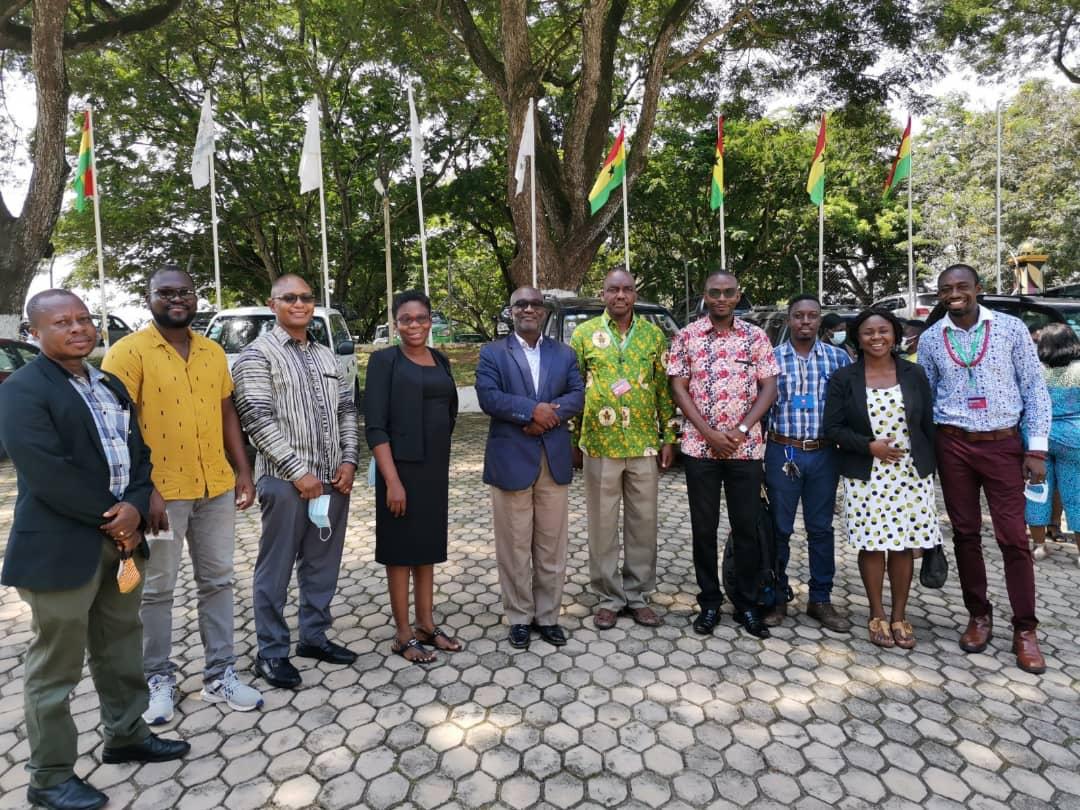About Us
The idea to set up the BSc Food Science and Technology programme was conceived in the late 1980s when three students from the then Department of Biochemistry and one student with agricultural engineering background obtained the Canadian International Development Agency (CIDA) scholarships. These students (W. O. Ellis, George Awuah and Miss Antonia Yarney) successfully graduated to start the Food Science and Technology programme, emerging as a fully-fledged department in 2014. Since then, the Department has grown to run other programmes. We are grateful to all the professors at McGill University, Canada and Kwame Nkrumah University of Science and technology, who initiated this process into fruition.
Three key instruments: strategic mandate; vision; and core values, guide our Department.
Our strategic mandate is to provide higher education for our teeming youth, train them to undertake research and communicate research findings to apply the knowledge.
Our vision is "to produce high calibre scientists imbibed with innovative food science and technology skills to support Ghana's developmental plan and beyond".
Our core values remain; Integrity, Discipline, Excellence, Teamwork and also Dedication to work.
Teaching and learning
We proud ourselves on outdooring graduates with the requisite skills to support the food value chain. We achieve these goals by running BSc (Hons) Food Science and Technology, which runs for four years. We run a Master of Science in Food Science and Technology and a Master of Science Food Quality Management programmes in 12 calendar months.
The Master of Science in Food Science and Technology programme has been designed to serve as a bridging link for holders of other bachelors in science-related programmes that seek experiential training in the sciences and technologies of food.
The Master of Science Food Quality and management is currently running in the distance learning mode. Applicants with requisite skills are admitted to train in food quality and safety courses (toxicology, food systems risks, food microbiology and emerging foodborne pathogens, and food laws).
The Department also runs a Master of Philosophy in Food Science and Technology for two academic years and tailor-made for applicants with a food science or technology background. We are again running a four-year Doctor of Philosophy in Food Science and Technology programme for applicants seeking more profound knowledge in a range of advanced research in the sciences and technologies of food. The Department is currently adding a relevant programme, diploma in Food Manufacturing, to train our youth in the food supply chain. Our quest to support the increasing demand for postgraduate training in food safety drives the Department to finalize a PhD Food Safety programme to provide the critical workforce for the control and management of food safety issues along the food chain. The Ghana National Accreditation Board regularly accredits all our programmes.
We have many collaborations, both locally and internationally. Locally, the Ghana Standards Authority, in their quest to provide the nation’s need for world-class experts in all aspects of food quality and safety, continue to support the Department. We collaborate to train personnel with the highest skills to manage standardization and certification mandated through regulatory activities.
We also have a robust academia-industry partnership with food industries where our third-year BSc undergraduates undergo not less than ten weeks of experiential internship as part of their training in the degree programme. This food industry-experiential training will soon expand to cover students in our updated Master of Science in Food Science and Technology programme.
Internationally, we partner with ISA Lille, France, to run a 3+2 programme where some of our students who wish may transfer to ISA Lille after the third year, to complete two years at ISA Lille and obtain double degrees as BSc. Food Science and Technology and Master of Science in Engineering. We are also currently in collaboration with Nestle Global in strengthening the quality of research into new food resources in the value chain. Again, we are collaborating with the University of Maryland College Park, Department of Food Science and Nutrition to deliver Global nutrition-sensitive food system content for students in both universities.
Laboratories
Our laboratories are well equipped to support us in carrying out our strategic mandate to accomplish our vision. There are four leading laboratories: food processing laboratory, food analysis laboratory, mycotoxin laboratory, and food fermentation laboratory. Our technical staff are also well-resourced to bring international best practices to support teaching, research and learning. To maintain a high-quality standard, some technical staff undergo periodic international training to impact their output positively. A certificate programme is set to begin to sustain technical staff's capacity for maintaining theory and practice. Our laboratories also train students that seek internship from home and abroad.
Our graduates continue to work in the food and beverage industries in various capacities as well as entrepreneurs or working for local and international food companies or pursuing further studies. The Department is a hub of modern food innovations with required facilities. We have developed various new food products from our local food materials and offer training in how to make virtually any food product.
Staff Strength


Currently, our faculty stands at fifteen (13). There are four professors, five senior lecturers and four lecturers. Besides, there are also visiting professors. There are also five technical staff that oversee the activities in our laboratories and one Senior Administrative Assistant. Our Department has a wide range of research activities, including teaching and learning, to equip the developmental agenda, particularly in the food value chain.
Graduate research and teaching assistants from the Ghana National Service Scheme are recruited yearly to sustain laboratory staff strength.
The Department has strong, experienced and admirable team players who are very interesting/enthusiastic for active teaching, learning and research activities. Our doors are open for collaboration in various food-related areas.
The Department also runs a couple of certificate courses. These include short courses such as; Food Hygiene, Extrusion Processing, Drying of Food Ingredients, Gari Processing Technologies, Sweetpotato Processing and Training, Artisanal Chocolate Making, HACCP, and Food Safety. We consider running non-degree, transcript offering courses for those who require any such training at any level in the Department.
Income generation
Our income generation activities have been excellent with in-flows from the mycotoxin laboratory, food analysis laboratory and the food production unit. Currently, we receive services for the analysis of products for certification. Specific services offered include; nutrient analysis, mycotoxins analyses, food quality assessment (e.g., proximate analysis), food plant design, food product development training, food fraud conferences, seminars and workshops, short certificate courses, chocolate drinks and fruit juices and other tailor-made training programmes. The Department also runs smart snacks to support students' needs, especially when they are in session.
Our Department will intensify dried food ingredients production (egg powder, pepper, okra, fruits, nuts, and powders of fufu, corn dough and cassava) in the coming years. We shall thus bring to optimum capacity our newly built food processing laboratory. Other products year marked for production include sweet potato-based biscuits and other cereal and cocoa-based drinks. Our goal is to hold a sizeable market share on Campus with these high-value products. Our newly refurbished food fermentation laboratory will lead the way by developing pure multi starter cultures for high quality flavoured fermented products such as cocoa beans, yoghurt, corn dough, fermented fruit drinks, and coffee beans.
Research focus/areas
The Department's faculty is organized into four main research groups; food chemistry, food microbiology, food processing, and food engineering. The food chemistry group will soon expand to include food safety when the PhD Food Safety programme starts.
Food chemistry and safety group
This research group encompasses the specific areas of each research member. It stretches from introductory food chemistry, involving reactions and functionalities of simple food components (carbohydrate, fats, proteins, and other sensory compounds), through to food toxicology and toxicovigilance, including exposures and risks of chemical hazards (acrylamide, dioxins, polyaromatic hydrocarbons, pesticide residues, heavy toxic metals) microbial hazards and mycotoxins.
Some of our members pursue studies in the characterization of food biopolymers and rheology, especially from indigenous food materials such as okra, sweet potato, and their functionality for potential food applications. Another focus of the group is on studies relating to nutraceuticals and functional foods, and agro-waste utilization. In our quest to sustain food security, a research study is involved in developing available food ingredients based on underutilized crops and edible insects.
Food processing group
This group is yet another dynamic research group with two key themes: post-harvest technology, management, and processing. There is also a strong focus on the food product and sensory science. Members of this group focus on storage systems and methods that sustain food commodities beyond their harvests. Specific areas involve the development of several sweet potato and yam products. Other products include cassava-based and other root tuber products, cereal products, fruit leathers, plantain-based products, and product diversification of underutilized crops. Studies into traditional foods and systems are also crucial in this research group. Other areas include value addition to local food crops.
Food microbiology group
The food microbiology and fermentation group are yet another active research group. Members in this group conduct studies in applied microbiology and quality assurance to food mycotoxicology and epidemiology. Also, this group carry out investigations in the microbial assessment of commodity products and microbial contamination of fruit drinks. Other studies expand to fermentation of soy milk and microbiological analysis of significantly underutilized fish species. Production of multi-purpose starter cultures and their commodity product applications is also vital to this research group's research area. Some group members currently focus on important bacteria food pathogens (Staphylococcus, Bacillus, Salmonella and Listeria). Possible resistance to heat, sanitizers and antibiotics of such bacteria is an emerging pathogen that is currently receiving attention.
Food engineering group
Members of this research group focus on food plant design, packaging, and fermentable products processing such as baking and brewing. Another central area of research in this group is drying technology. Such drying technologies have been used to produce commodity products, including cocoa and coffee beans. Mainly, thin-layer solar drying kinetics of Amaranthus and Xanthosoma leaves have been studied by this group. Members in the group also conduct studies into the production of tomato ketchup employing gravity means of concentration and optimization of fresh Moringa oleifera beverages' acceptability. The output of cocktail fruit juice from oranges, tomatoes and carrots have also been carried out. There is a strong research interest in starch and food components interactions in this group as well.
Current projects
Current projects in the Department include the following:
- Modelling of solar food drying technology,
- Toxicovigilance of fish and fish products,
- Mycotoxicosis of cereals and impact on female processors,
- Strengthening the roots and tubers value chain in Ghana,
- Yam storage,
- Aflatoxin in groundnut and peanut,
- High-quality cassava flour and composite bread,
- Food composition,
- Okuafopa,
- Picks-three,
- Cereal processing,
- Seed legumes-protein alternative,
- Sweetpotato,
- Palm weevil larva (Akokono),
- Biopolymer (okra pectin),
- Fermented commodities,
- Processed foods and cancer.